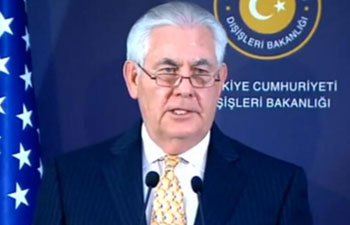WASHINGTON, Feb. 16 (Xinhua) -- A plan proposed by the Trump administration to restrict steel and aluminium imports drew broad opposition from domestic stakeholders and the international community.
U.S. Commerce Department on Friday unveiled its recommendations for President Donald Trump to restrict imports of steel and aluminium products.
The agency found that "the quantities and circumstances of steel and aluminum imports 'threaten to impair the national security,' as defined by Section 232 (of the Trade Expansion Act of 1962)."
It recommended several options for the president, which include a blanket tariff for all countries, quotas, or high tariffs targeted at specific countries, including China.
Following the publication of the 232 investigation reports, the National Tooling and Machining Association and Precision Metalforming Association issued a joint statement, saying the recommendations would damage downstream industries.
"The recommendations by the Commerce Department to impose steep tariffs on steel would devastate downstream U.S. steel consuming manufacturers who employ 6.5 million Americans, compared to the 80,000 employed by the domestic steel industry," said the statement.
In a meeting with Trump this week, many U.S. lawmakers also voiced concerns over trade restrictions of steel and aluminium imports, saying it would drive up consumer costs and invite retaliation from other countries.
"The availability of those imports and the absence of additional duties on those means that those goods can be manufactured and sold more cost effectively. That keeps a whole lot of people, including a whole lot of voters in each of our states ... in jobs," said Republican Senator Mike Lee at the meeting.
"Even though there may be some job winners from an action like this, strongly suspect that, as has at times been the case in the past, you would end up with net job losses in the United States," Lee said.
"The 232 (investigation) is a different matter, and invoking national security, when I think it's really hard to make that case, invites retaliation that will be problematic for us," said Republican Senator Pat Toomey.
Experts also pointed out that history has shown that the U.S. trade protectionism measures often proved to be failures.
The Obama administration's decision to levy safeguard tariffs on Chinese tires in 2009 temporarily helped save 1,200 jobs in the U.S. tire industry, but at a cost of 900,000 U.S. dollars per job due to higher prices, according to a study by the Peterson Institute for International Economics.
"American trade protectionism - even in the periods most often cited as 'successes' - not only has imposed immense economic costs on American consumers and the broader economy, but also has failed to achieve its primary policy aims and fostered political dysfunction along the way," said Scott Lincicome, an international trade attorney and adjunct professor at Duke University.
"Using the national security power provided for by Section 232 of the Trade Expansion Act of 1962 to justify steel protectionism sets a dangerous precedent - one that could unwind the post-World War II rules-based global trading system that had been an enormous benefit to the United States," said Clark Packard, trade policy manager at the Washington-based think tank R Street Institute, on Friday.
"Heavy steel tariffs will weaken the United States both economically and strategically," he said.
At a press teleconference on Friday, Commerce Secretary Wilbur Ross admitted that if imports restrictions come into action, the United States might face legal challenge at the World Trade Organization or trade retaliation from other countries.
European Union's trade chief Cecilia Malmstrom has said that the EU will seek retaliation measures if Trump administration's 232 investigation damages European steelmakers.
In regard to potential damage to Chinese exports, David Dollar, a senior fellow at the Brookings Institution, told Xinhua that there are a lot of value chains that involve production both in the United States and China.
"If you start disrupting those value chains, that will have large impact on U.S. economy," said Dollar.
He also expects that stakeholders in the United States who benefit from the bilateral economic relationship would urge the Trump administration to draw up a more rational policy toward China.













